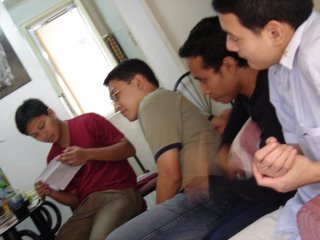
Mark 6:1-6: A prophet is without honor in his country
It takes a wrong atmosphere in order for a Gospel not to take effect; it takes a wrong attitude in order for an inspiring gesture not to touch our lives. Jesus’ words were ineffective in
Let us see how this gospel applies to our lives. It is easy to believe those whom we do not know, but often those who knows us can speak the truth about ourselves, and the truth about us is painful. We have to watch out for the real reason why we do not listen to someone whom we are familiar with, lived with, and grew up with. We usually do not listen to the truth these people say, because our attention is drawn to their background and their faults which are also familiar to us. Our prejudices and biases shield us from listening to them because they are not credible to us.
We can either help or hinder the work of Christ in our lives. Those who are familiar with ourselves--- our parents, our close friends, people we live with in a community or a dormitory or a boarding house--- may give us things we need to know, even become instruments of God. Whatever they say can be valid reason for us to listen to them. They might be giving us feedback that would help us. There are certain things in our lives that we cannot see, but others can: they are our blind spots. There is a tool to understand what I am saying: it is the Johari’s Window, named after Joseph Luft and Harry Ingham, their inventors. Each person is represented by these window panes.
| | Known to Self | Not Known to Self |
| Known to Others | OPEN | BLIND |
| Not Known to Others | HIDDEN | UNKNOWN |
There is a part of us which is OPEN: those known by me and those by others. For example, my name, that I am a priest, that I am a Jesuit. And if you open this blog, you will know what I read, what I listen to, what I like doing in my spare time, my interests, and my basic profile. There are things about us which we do not know, but others see: they are our BLIND spots. For example, in a café, you may notice that my attention is not totally focused on you because my eyes wander around those who come in and out of the café door. I am unaware of this and the information is in my blind spot. Feedback from you, will surface the truth. Our secrets belong to the third quadrant: they are HIDDEN from others, but known to us. Finally, there are things that are UNKNOWN to others and to us. For example, the meaning of our dreams. The main goal of the Johari’s Window is enlarging the OPEN quadrant, by interacting with people.
If we listen to others, we are able to get to know the truth about ourselves. In Johari’s Window, these truths are surfaced and placed in the OPEN quadrant. When we become aware of these things, we are able to do something about it. God has given us an opportunity to grow. Feedback might be the voice of God challenging us to change. We can open the door to Him, or slam it in His face.
*Picture by Neo Saicon SJ

No comments:
Post a Comment